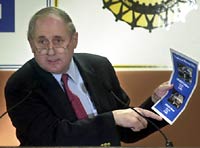Senate Backs Sensible Fuel Economy
Standard
 AP/Wide World
Photos AP/Wide World
Photos |
|
Sen. Carl Levin, D-Mich., discusses the CAFE
issue with members of UAW Local 594 at GM’s Pontiac, Mich.,
assembly plant. |
The U.S. Senate adopted a sensible, bipartisan approach to
improving fuel economy standards for cars and trucks in March,
thanks in large part to a grassroots lobbying effort by UAW
activists.
The legislation, sponsored by Michigan Democrat Carl Levin and
Missouri Republican Christopher Bond, passed by a strong 62-38
margin on March 13, as an amendment to the overall energy bill
before Congress.
A number of senators decided to support the amendment after
hearing from UAW members, who have a vital interest in how the auto
industry is regulated.
The Levin-Bond bill requires the National Highway Transportation
Safety Administration (NHTSA) to recommend increases in the current
27 miles-per-gallon (mpg) corporate average fuel economy (CAFE)
standard for cars within 24 months. The agency must take into
account fuel economy, vehicle safety and the impact on U.S. jobs.
Conserving Energy--and Jobs
The CAFE
standards, first passed in 1975 with UAW support, promote fuel
efficiency by requiring each automaker to meet a miles-per-gallon
standard for the entire fleet of vehicles it sells in the United
States.
The UAW continues to support “mandatory fuel economy standards…to
promote fuel efficiency and reduced dependence on imported oil,” UAW
Legislative Director Alan Reuther told a Senate Subcommittee last
December.
Our union, Reuther told Senators, supports a comprehensive
approach to energy and environmental policy, including controls on
sulfur emissions, tax credits for the sale of advanced
fuel-efficient vehicles, and better public transit, to provide
“energy-saving alternatives to private motorized modes of
transportation.”
But proposals first floated this winter by Sen. John Kerry,
D-Mass., and Sen. Ernest Hollings, D-S.C., later joined by Sen. John
McCain, R-Ariz., leaned toward a one-sided approach to energy
issues, with the danger of destroying thousands of good-paying union
jobs in the process.
“We do need conservation,” said Sen. Barbara Mikulski, D-Md., a
backer of the Levin-Bond bill. “I believe in job conservation.
American job conservation.”
Kerry, Hollings and McCain wanted to raise the CAFE standard to
an unrealistic 36 mpg by 2015. This leaps far ahead of the feasible
fuel standards projected in a recent study by the National Academy
of Sciences.
Bias Against the Big Three
The
Kerry-Hollings-McCain proposals would have hit UAW members with a
double whammy, aiding foreign automakers at the expense of the Big
Three--and giving the Big Three new incentives to move small car
production overseas.
Speaking at a town hall meeting with members of UAW Local 2166
outside GM’s Shreveport, La., plant in February, UAW Vice President
Richard Shoemaker said an extreme boost in CAFE standards “would
discriminate against General Motors, Ford and DaimlerChrysler.”
“Their product mix is more oriented toward larger cars and light
trucks,” explained Shoemaker, who directs the union’s General Motors
Department. “It would result in the Big Three having to increase
their fuel economy by 40 to 50 percent, compared to less than a 15
percent increase required for Honda.”
Although the Shreveport event was co-sponsored by GM, Shoemaker
did not hesitate to criticize a little-known aspect of the proposed
CAFE legislation which would have led to more Big Three outsourcing.
Kerry, Hollings and McCain would have given NHTSA the option of
eliminating the distinction--required in current law--between
domestic and foreign car fleets.
High Cost, No Benefit
There is no
discernible environmental benefit to combining foreign and domestic
fleets for the purpose of calculating fuel economy standards--but
the jobs impact would be huge.
“The Big Three would be able to outsource their small car
production to foreign countries,” Shoemaker warned. “Why? Because
they would no longer be required to average the fuel economy of more
efficient, domestically built small cars with less efficient large
cars produced here.”
The Levin-Bond amendment is likely to remain intact in the final
energy legislation passed by Congress, because the bill passed by
the House of Representatives last August includes a similar
measure.
| 


